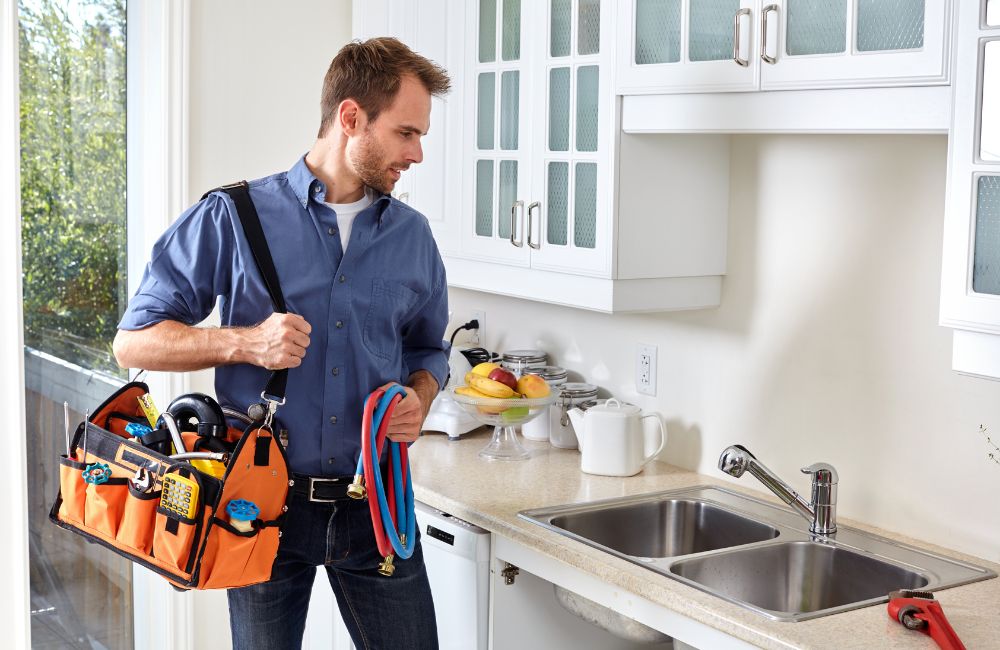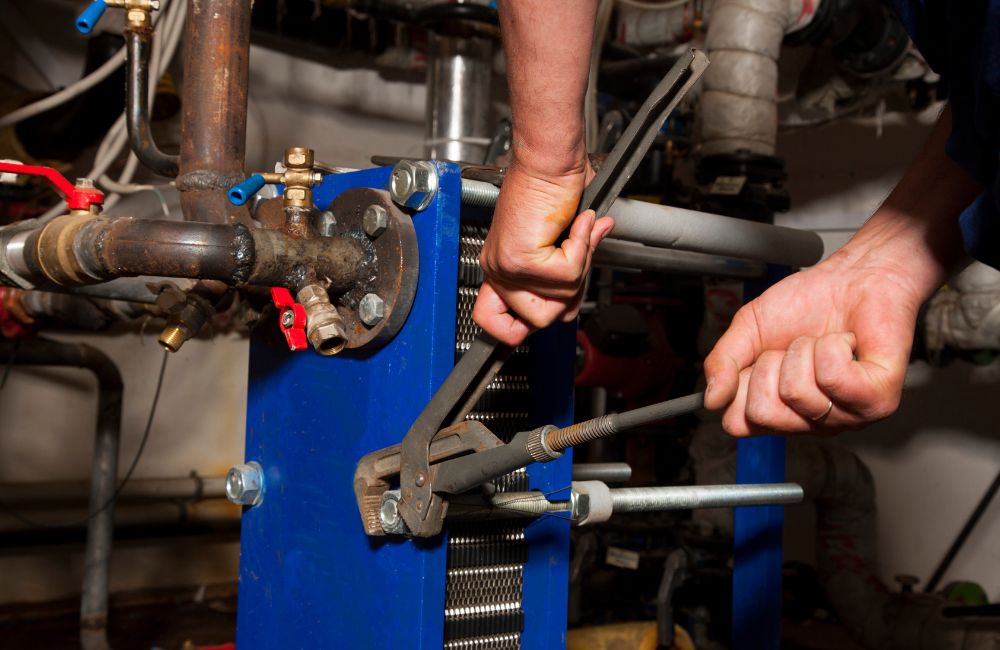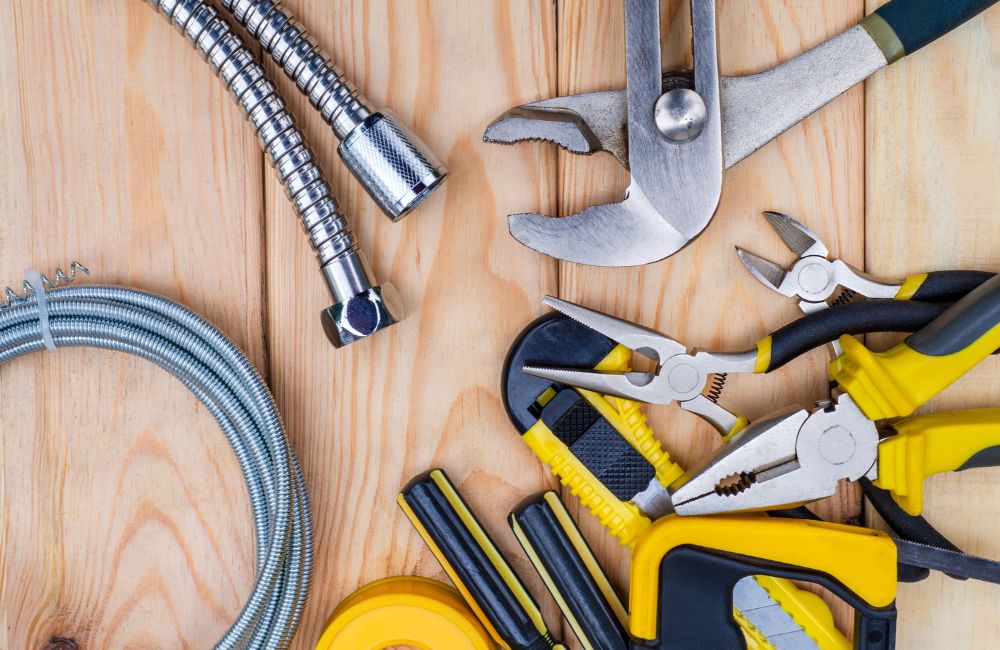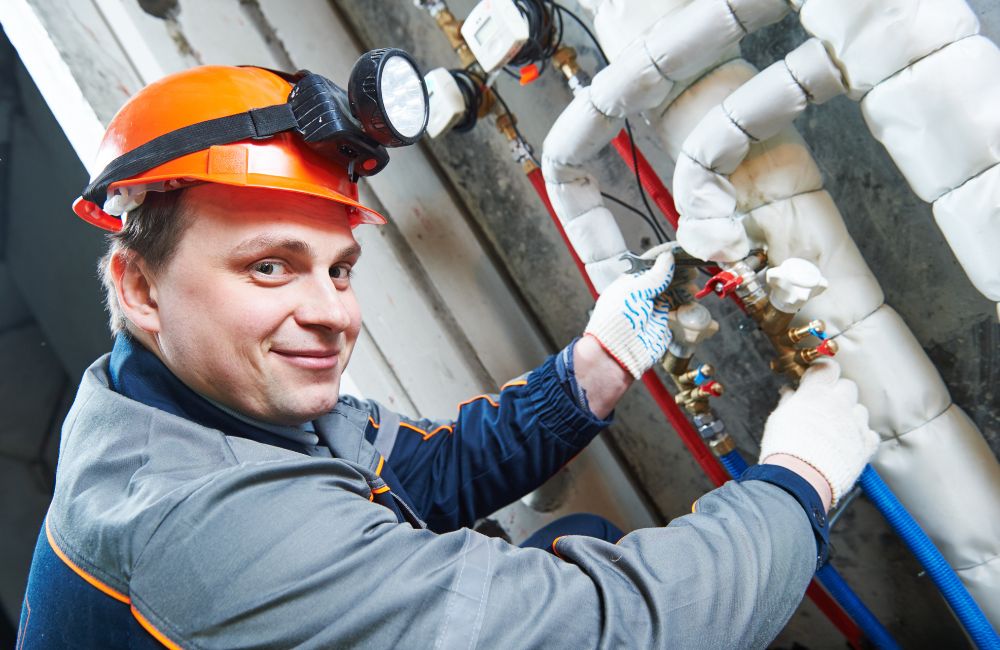Water damage is one of the most dreaded issues a homeowner can face. It can ruin your belongings, weaken your home’s structural integrity, and lead to costly repairs. However, with the right preventative measures, many causes of water damage can be avoided. Here are the tips from local plumbers in Torrington, CT, on how to protect your home from water damage.
Table of Contents
Key Takeaways
What Are the Causes of Water Damage
Why Early Detection is Important
9 Ways to Prevent Water Damage
1. Protect Your Pipes Year-Round
2. Upgrade to a Reliable Sump Pump
3. Install Leak Detection Devices
4. Add Multiple Shut-Off Valves
5. Schedule Regular Plumbing Maintenance
6. Upgrade Your Washing Machine Hoses
7. Flush Your Water Heater Regularly
8. Be Mindful of Tree Planting Near Plumbing
9. Turn Off the Water Main When Leaving for Extended Periods
What to Do If Water Damage Occurs
Why Choose Local Plumbers for Water Damage Prevention
Frequently Asked Questions
Take Action Today — Protect Your Home with L&P Plumbing!
| Key Takeaways ✔ Small cracks or leaks in pipes, often caused by corrosion or age, can lead to significant water damage if undetected. ✔ In cold climates, water can freeze and burst pipes, causing extensive water damage. ✔ Appliances like washing machines and water heaters can fail and leak, leading to water damage. ✔ Damaged shingles or clogged gutters can allow water to seep in, damaging walls and ceilings. ✔ Regularly inspect for water stains, unexplained water bill increases, mold, and musty odors to catch leaks early. ✔ Ensure your sump pump is in good working order, and consider backup systems to prevent basement flooding. ✔ Plant trees away from plumbing lines to avoid root damage to underground pipes. ✔ Install multiple shut-off valves in key areas to quickly stop water flow during leaks and prevent extensive damage. |

What Are the Causes of Water Damage
Water damage can stem from a variety of sources, each posing unique risks to your home’s structure and safety. Local plumbers often deal with water damage caused by a variety of factors, including:
- Leaking Pipes: Over time, pipes can develop small cracks or leaks due to corrosion, loose fittings, or age. These leaks can go unnoticed for long periods, causing significant damage before they are detected.
- Burst Pipes: In colder climates, water inside pipes can freeze, expand, and cause the pipes to burst, releasing large amounts of water into your home.
- Appliance Malfunctions: Appliances such as washing machines, dishwashers, and water heaters can develop leaks or fail, leading to water damage.
- Roof Leaks: Damaged shingles, improper flashing, or clogged gutters can allow water to seep into your home, damaging walls, ceilings, and insulation.
- Clogged Gutters: When gutters become clogged with leaves and debris, water can overflow and pool around your home’s foundation, leading to basement flooding and structural issues.
Why Early Detection is Important
Early detection of potential water damage issues is a key factor in preventing extensive damage. Local plumbers emphasize the need to regularly inspect your home for signs of water damage and take immediate action if you notice any of the following:
- Water Stains on Walls or Ceilings: These could indicate a leak from pipes, the roof, or windows. Ignoring these stains can lead to mold growth and more severe structural damage.
- Unexplained Increases in Water Bills: A sudden spike in your water bill without a corresponding increase in usage may indicate a hidden leak.
- Mold or Mildew Growth: Mold and mildew thrive in damp environments. If you notice mold growing in areas that should be dry, such as walls or ceilings, it could be a sign of a hidden leak.
- Musty Odors: A persistent musty smell can be a sign of water damage, even if you don’t see visible signs of water. This odor often indicates mold growth behind walls or under floors.
Ignoring early signs of water damage can lead to extensive and costly repairs. In fact, recent data reveals that the average U.S. household claim for water damage and freezing surpasses $12,500, making early detection and prompt action essential.

9 Ways to Prevent Water Damage
1. Protect Your Pipes Year-Round
One of the most effective ways to prevent water damage is by protecting your pipes from freezing and bursting, especially during colder months. Local plumbers recommend the following measures to protect your pipes:
- Insulate Pipes: Insulate pipes in unheated areas, such as basements, attics, and crawl spaces. Pipe insulation is relatively inexpensive and can prevent costly damage caused by frozen pipes.
- Seal Cracks and Openings: Seal any cracks or openings in walls, floors, or ceilings near pipes to prevent cold air from reaching them.
- Keep the Heat On: Even when you’re away from home, keep your thermostat set to at least 55°F to prevent pipes from freezing.
In addition to these measures, local plumbers suggest letting a small stream of water flow through the faucets during extremely cold weather. This keeps water moving in the pipes, reducing the risk of freezing.
2. Upgrade to a Reliable Sump Pump
A sump pump is your home’s first line of defense against basement flooding. Local plumbers advise homeowners to ensure their sump pump is in good working order, especially if they live in areas prone to heavy rainfall or have a high water table. Upgrading to a newer, more efficient model may also be a good idea if your sump pump is more than 10 years old. Here’s what local plumbers recommend:
- Regular Maintenance: Test your sump pump at least once a year by pouring a bucket of water into the sump pit to see if the pump activates and drains the water properly.
- Consider a Backup System: If your home is prone to flooding, consider installing a backup sump pump system that runs on batteries in case of a power outage.
- Install a Water Alarm: A water alarm can alert you if the sump pump fails and water begins to accumulate in the basement.
3. Install Leak Detection Devices
Leak detection devices are an excellent investment for preventing water damage. These devices can detect leaks early and alert you before the situation escalates. Household leaks can waste up to 1 trillion gallons of water across the nation each year, making early detection crucial. Local plumbers recommend installing leak detectors in high-risk areas, such as:
- Near Water Heaters: Water heaters are prone to leaks, especially as they age. A leak detector can help you catch a leak before it causes significant damage.
- Under Sinks: Leaks under sinks are common and can go unnoticed for long periods. Installing a leak detector can help you catch these leaks early.
- Behind Appliances: Appliances such as washing machines, dishwashers, and refrigerators can develop leaks that are difficult to detect. Placing a leak detector behind these appliances can provide early warning of a problem.
There are various types of leak detection devices available. These range from simple water alarms that sound when they detect moisture to more advanced systems that can shut off the water supply automatically if a leak is detected. Local plumbers can help you choose the right leak detection system for your home.
4. Add Multiple Shut-Off Valves
In the event of a plumbing emergency, knowing how to quickly shut off the water supply is essential. Local plumbers recommend installing shut-off valves in key areas of your home, such as:
- Under Sinks: Installing shut-off valves under sinks allows you to isolate the water supply to a specific area without shutting off the water to the entire house.
- Behind Toilets: A shut-off valve behind each toilet allows you to stop water flow to the toilet in case of a leak or overflow.
- Near Appliances: Install shut-off valves near appliances like washing machines, dishwashers, and refrigerators. This allows you to quickly shut off the water if one of these appliances begins to leak.
Having multiple shut-off valves in your home can minimize damage in case of a leak and make it easier to perform repairs. Local plumbers can install these valves for you and show you how to operate them in an emergency.
5. Schedule Regular Plumbing Maintenance
Routine plumbing inspections and maintenance are vital in preventing water damage. Local plumbers suggest having your plumbing system checked annually to identify and address any potential issues before they become major problems. Regular plumbing maintenance includes:
- Inspecting Pipes for Leaks: Local plumbers will inspect your pipes for signs of leaks, corrosion, or damage and make repairs as needed.
- Checking Water Pressure: High water pressure can damage pipes and cause leaks. Local plumbers can check your water pressure and install a pressure-reducing valve if necessary.
- Cleaning Drains: Clogged drains can lead to water backing up and causing damage. Local plumbers can clean your drains to ensure they are flowing freely.
6. Upgrade Your Washing Machine Hoses
Washing machine hoses are a common source of water damage in homes. Local plumbers recommend replacing old rubber hoses with stainless steel braided hoses, which are more durable and less prone to bursting. Here’s why local plumbers prefer stainless steel hoses:
- Durability: Stainless steel hoses are more resistant to damage from high water pressure and temperature fluctuations.
- Longevity: Stainless steel hoses last longer than rubber hoses, reducing the likelihood of a hose bursting and causing water damage.
- Easy Installation: Local plumbers can quickly and easily replace your old hoses with stainless steel ones, giving you peace of mind.
7. Flush Your Water Heater Regularly
Sediment buildup in your water heater tank can reduce its efficiency and lead to water damage if not properly maintained. Local plumbers advise flushing your water heater at least once a year to remove sediment and prevent it from accumulating. Here’s how local plumbers suggest doing it:
- Turn Off the Power Supply: Before flushing the water heater, turn off the power supply (for electric heaters) or the gas supply (for gas heaters).
- Drain the Tank: Attach a hose to the drain valve at the bottom of the tank and direct the water to a drain. Open the drain valve and allow the water to flow out, flushing the sediment with it.
- Refill the Tank: Once the tank is drained, close the drain valve and remove the hose. Open the cold water supply valve to refill the tank. When the tank is full, turn the power or gas supply back on.
8. Be Mindful of Tree Planting Near Plumbing
While trees can add beauty and value to your property, their roots can cause significant damage to your plumbing system if planted too close. Local plumbers warn that tree roots are naturally drawn to water and can penetrate and clog underground pipes, leading to costly repairs. To prevent this, local plumbers recommend the following:
- Plant Trees at a Safe Distance: Local plumbers suggest planting trees at least 10 to 15 feet away from your home’s plumbing lines. This distance helps prevent tree roots from reaching and damaging the pipes.
- Choose Tree Types Carefully: Some trees have more aggressive root systems than others. Local plumbers recommend choosing tree species with less invasive roots, such as dogwoods or Japanese maples.
- Monitor Tree Growth: As trees grow, their root systems expand. Local plumbers advise keeping an eye on trees near your plumbing and considering root barriers if necessary.
9. Turn Off the Water Main When Leaving for Extended Periods
If you’re planning to be away from home for an extended period, such as a vacation or long weekend, local plumbers suggest turning off the water main to prevent potential water damage. This simple step can save you from returning to a flooded home due to an unexpected leak. Here’s how to do it:
- Locate the Main Shut-off Valve: The main shut-off valve is usually located near the water meter, either in your basement, crawl space or outside your home. Local plumbers can help you locate it if you’re unsure.
- Turn Off the Valve: Turn the valve clockwise to shut off the water supply. This stops water from flowing into your home, preventing leaks and floods while you’re away.
- Turn on a Faucet: After shutting off the water main, turn on a faucet to relieve any remaining pressure in the pipes. This further reduces the risk of leaks.

What to Do If Water Damage Occurs
Despite your best efforts, water damage can still occur. If you find yourself dealing with water damage, it’s important to act quickly to minimize the impact. Local plumbers recommend the following steps:
- Shut off the water supply: If the damage is caused by a plumbing issue, immediately shut off the water main to prevent further flooding.
- Document the damage: Take photos and videos of the affected areas to document the extent of the damage for insurance purposes.
- Remove excess water: Use towels, mops, or a wet/dry vacuum to remove as much water as possible. If the damage is extensive, consider renting professional-grade equipment or hiring a water damage restoration company.
- Call a local plumber: Local plumbers can assess the situation, repair any damaged plumbing, and provide guidance on the next steps for water damage restoration.
Why Choose Local Plumbers for Water Damage Prevention
When it comes to preventing water damage, choosing local plumbers has several advantages. Local plumbers are familiar with the specific plumbing challenges in your area and can offer tailored advice and solutions to keep your home safe. Here’s why local plumbers are the best choice:
- Knowledge of Local Infrastructure: Local plumbers understand the plumbing systems and infrastructure in your area, allowing them to provide more accurate and effective solutions.
- Personalized Service: Local plumbers are more likely to provide personalized service and build long-term relationships with their customers. This means you can count on them for regular maintenance, emergency repairs, and ongoing support.
- Quick Response Times: In case of an emergency, local plumbers can respond quickly to prevent further damage and begin repairs.
- Understanding of Local Building Codes: Local plumbers are well-versed in the building codes and regulations specific to your area. This ensures that any work they perform is up to code, reducing the risk of legal issues and ensuring the safety and longevity of your plumbing system.
- Strong Community Reputation: Local plumbers often rely on word-of-mouth and community reputation to build their business. This means they are more likely to go above and beyond to provide high-quality service, knowing that their reputation within the community is at stake.
- Support for Local Economy: Hiring local plumbers helps support the local economy. By choosing a local service provider, you’re contributing to the prosperity of your community, which in turn benefits everyone in the area, including yourself.

Frequently Asked Questions
How do I find a reliable local plumber in my area?
To find a reliable local plumber, start by checking online reviews on platforms like Google or Yelp, where previous customers share their experiences. Ask friends, family, or neighbors for recommendations, as word-of-mouth is often the most trustworthy source. Ensure the plumber is licensed and insured, and don’t hesitate to ask for proof before hiring.
What should I do if I suspect a hidden water leak?
If you suspect a hidden leak, first monitor your water meter before and after a two-hour period without water use; if it changes, you likely have a leak. Listen for the sound of running water when none is being used, as this can indicate a leak behind walls or under floors. Contact a local plumber immediately to conduct a thorough inspection and address any leaks before they cause significant damage.
How can local plumbers help with water pressure issues?
Local plumbers can assess your home’s water pressure by checking the pressure regulator and adjusting it if necessary. They can also inspect for leaks or blockages in your pipes, which can reduce pressure. If your pipes are old or corroded, a local plumber may recommend replacement to restore proper water pressure.
Why is my water heater making strange noises?
Strange noises, such as popping or rumbling, in your water heater often result from sediment buildup at the bottom of the tank, which can affect efficiency. This sediment can cause the heater to overheat, leading to unusual sounds. A local plumber can flush the tank to remove sediment or check for failing components that might need replacement.
What are the signs that my home needs a plumbing inspection?
Frequent clogs, slow drains, and unusual odors coming from your pipes are clear signs that your plumbing system needs attention. Water stains on walls or ceilings and fluctuating water pressure also indicate underlying plumbing issues. A local plumber can perform a detailed inspection to identify and resolve these problems before they worsen.
Post that you may also like: 7 Ways Your Expert Local Plumber Can Help Save Water Bills

Take Action Today — Protect Your Home with L&P Plumbing!
Don’t wait until water damage disrupts your life. Residents of Torrington, CT, trust L&P Plumbing for expert plumbing services that keep your home safe and secure. Whether you need routine maintenance, emergency repairs, or a thorough inspection, L&P Plumbing in Torrington, CT, is here to help.
Contact L&P Plumbing today to ensure your plumbing system is in top shape and protect your Torrington, CT home from costly water damage.

